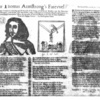Sir Thomas Armstrong's Farevvel:
Title
Sir Thomas Armstrong's Farevvel:
Subtitle
Who for High-Treason (conspiring against the Life of the King, and his Royal Brother, and the subversion of the Government;) was on the 14th. day of Iune, 1684. condemned to be Drawn, Hang'd, and Quarter'd; and was accordingly executed at Tyburn, on the 20th. of the said Month, in the view of many Spectators.
Synopsis
Sir Thomas Armstrong was executed in 1684 for his involvement in the Rye House Plot which planned to assassinate Charles II and his brother and heir James II. Armstrong was not executed in the usual place for nobility, Tower Hill, but instead he was drawn on a hurdle to Tyburn, where he was hanged and quartered. This was the most shameful way to be executed, and is why Armstrong sings that 'the thoughts of a Rope are most dreadful to me,/That must hang for my Crimes at the 3 cornerd tree'.
Digital Object
Image notice
Full size images of all ballad sheets available at the bottom of this page.
Image / Audio Credit
Set to tune of...
Transcription
Farewel Worldly Pleasures and fading delight,
For now all my days must be turnd into night,
Now suffer I must, and the race I have run,
Has shortned my days, and my thred it is spun:
Oh wretch that I was for to Plot or Conspire
Against that good Prince, who the world do admire!
And now for the same I am in a sad plight,
A poor, and distressed, unfortunate Knight.
How might I have lived in splendour and fame,
That now by true Subjects am greatly to blame:
No pitty I find there is falls to my share,
My spirits decay, and I fall in despair,:
But how could I expect any favour to find,
That harbourd such thoughts in my treacherous mind
All you that in mercy do fix your delight,
Now pitty etc.
My days, that long time I in pleasure did spend,
In shame and disgrace like a Traytor I end;
Though it grieves me to think, yet confess it I must,
The Sentence past on me is nothing but just;
For the deeds I have done, & the words I have said,
Were I to be punishd by losing my Head,
Grim death would the less then my senses affright,
That am a distressed etc.
But the thoughts of a Rope are most dreadful to me,
That must hang for my Crimes at the 3 cornerd tree,
And there in the view of a thousand, or more,
Receive what I long had deserved before.
Oh Justice severe! how swift are thy wings
To pursue the Blood-suckers of mercifull Kings;
Who in thoughts are oppressed by day and by night,
Like me a distressed etc.
Though I had got over and crossed the Seas,
My mind was afflicted, my soul not at ease,
My conscience was filled with horrour and d[r]ead,
That Vengeance would follow where ever I fled;
And now to my sorrow most certain I find
That which so long time hath afflicted my mind,
And w[i]ll now put an end to my joy and delight,
Tha[t] am a distressed unfortunate Knight.
For now all my days must be turnd into night,
Now suffer I must, and the race I have run,
Has shortned my days, and my thred it is spun:
Oh wretch that I was for to Plot or Conspire
Against that good Prince, who the world do admire!
And now for the same I am in a sad plight,
A poor, and distressed, unfortunate Knight.
How might I have lived in splendour and fame,
That now by true Subjects am greatly to blame:
No pitty I find there is falls to my share,
My spirits decay, and I fall in despair,:
But how could I expect any favour to find,
That harbourd such thoughts in my treacherous mind
All you that in mercy do fix your delight,
Now pitty etc.
My days, that long time I in pleasure did spend,
In shame and disgrace like a Traytor I end;
Though it grieves me to think, yet confess it I must,
The Sentence past on me is nothing but just;
For the deeds I have done, & the words I have said,
Were I to be punishd by losing my Head,
Grim death would the less then my senses affright,
That am a distressed etc.
But the thoughts of a Rope are most dreadful to me,
That must hang for my Crimes at the 3 cornerd tree,
And there in the view of a thousand, or more,
Receive what I long had deserved before.
Oh Justice severe! how swift are thy wings
To pursue the Blood-suckers of mercifull Kings;
Who in thoughts are oppressed by day and by night,
Like me a distressed etc.
Though I had got over and crossed the Seas,
My mind was afflicted, my soul not at ease,
My conscience was filled with horrour and d[r]ead,
That Vengeance would follow where ever I fled;
And now to my sorrow most certain I find
That which so long time hath afflicted my mind,
And w[i]ll now put an end to my joy and delight,
Tha[t] am a distressed unfortunate Knight.
Method of Punishment
drawing, hanging, and quartering
Crime(s)
treason
Gender
Date
Execution Location
Tyburn
Printing Location
Printed for J. Wright, J. Clark, W. Thackery, and T. Passenger.
Tune Data
Packington's Pound is often cited as Digby's Farewell, Packingtons Pound or Amintas' Farewell. The tune first appeared in 1671 and was popular for execution ballads (Simpson 1966, pp. 181-187, 564-570).
Collection
Citation
“Sir Thomas Armstrong's Farevvel:,” Execution Ballads, accessed March 4, 2026, https://omeka.cloud.unimelb.edu.au/execution-ballads/items/show/889.



